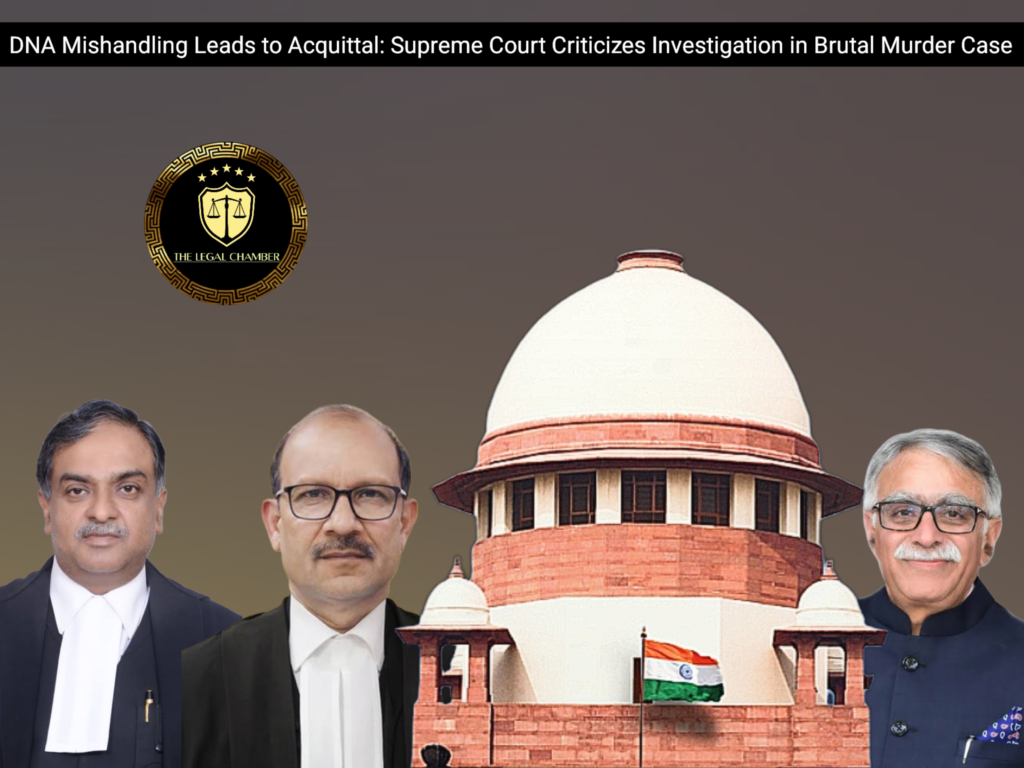
The Supreme Court acquitted the accused in a double murder and rape case, ruling that the prosecution failed to establish guilt beyond reasonable doubt. The Court highlighted critical lapses, including unreliable circumstantial evidence, mishandled DNA samples, an improperly conducted Test Identification Parade, and lack of motive. It emphasized strict adherence to forensic protocols and reaffirmed that circumstantial evidence must form an unbroken chain pointing solely to the accused’s guilt. The judgment underscored the prosecution’s burden to ensure a fair investigation and maintain evidentiary integrity.
Facts Of The Case:
In May 2011, two young victims—Ezhil Muthalvan (D1) and Kasturi (D2)—were found brutally murdered near Suruli Falls in Tamil Nadu. D1 had left home under the pretext of playing cricket, while D2 told her parents she was going to college. Their bodies, discovered days later in a decomposed state, bore severe chop wounds, and D2 showed signs of sexual assault. The prosecution alleged that the accused, Kattavellai @ Devakar, attacked them after attempting to rob their jewelry. The case relied heavily on circumstantial evidence, including the “last seen” theory based on witness PW-5, who claimed to have seen the accused threatening the victims. The accused was arrested following a suspicious suicide attempt, and his confession led to the recovery of a gold chain and other items. However, the Supreme Court found multiple investigative failures—delayed DNA sample handling, an unreliable Test Identification Parade, lack of forensic examination of recovered weapons, and the non-examination of a key witness (Bhagyalakshmi). The Trial Court and High Court had earlier convicted and sentenced the accused to death, but the Supreme Court overturned the verdict, citing insufficient and tainted evidence. The judgment highlighted procedural lapses and stressed the necessity of a foolproof chain of evidence in capital cases.
Procedural History:
The case originated in 2011 when the accused, Kattavellai @ Devakar, was charged under Sections 302 (murder), 376 (rape), and 397 (robbery) of the IPC for the brutal killings of two victims near Suruli Falls, Tamil Nadu. The Principal District and Sessions Judge, Theni, convicted him in March 2018, imposing the death penalty for one murder and life imprisonment for the other, along with additional sentences. The conviction was based on circumstantial evidence, including last-seen testimony, DNA reports, and recovered material objects. The Madras High Court (Madurai Bench) upheld the conviction and death sentence in March 2019 in a mandatory confirmation proceeding under Section 366 CrPC. On appeal, the Supreme Court scrutinized the evidence and found critical lapses—including mishandled DNA samples, an unreliable Test Identification Parade, and investigative flaws—leading to the accused’s acquittal in July 2025. The judgment emphasized the prosecution’s failure to establish guilt beyond reasonable doubt and reinforced stringent standards for circumstantial evidence in capital cases.
READ ALSO :Landmark Ruling: Supreme Court Says Two Companies Are One for EPF Compliance
Court Observation:
The Supreme Court made several critical observations while acquitting the accused. It held that the prosecution failed to establish a complete chain of circumstantial evidence, as required under the Panchsheel principles from Sharad Birdhichand Sarda v. State of Maharashtra. The Court noted serious lapses in the investigation, including improper handling of DNA evidence, unexplained delays in forensic analysis, and contamination risks due to the postmortem being conducted at the crime scene. It rejected the “last seen” theory, observing that witness PW-5’s conduct was unnatural and unreliable. The Test Identification Parade was deemed invalid as the witness had prior exposure to the accused. The Court also criticized the non-examination of key witness Bhagyalakshmi and the lack of forensic examination of recovered weapons. Emphasizing the sanctity of biological evidence, the Court issued binding guidelines for DNA collection, storage, and chain of custody. It reiterated that in death penalty cases, the prosecution must meet the highest standards of proof, and any reasonable doubt must benefit the accused. The judgment underscored the constitutional right to a fair trial under Article 21 and highlighted systemic investigative failures that compromised justice.
Final Decision & Judgement:
In its final judgment, the Supreme Court acquitted Kattavellai @ Devakar, setting aside his conviction and death sentence imposed by the Trial Court and upheld by the High Court. The Court held that the prosecution failed to prove guilt beyond reasonable doubt due to multiple irreparable flaws in the investigation and evidence. It found the circumstantial evidence incomplete and unreliable, noting critical gaps in the DNA analysis, improper handling of forensic samples, and the absence of a legally sound Test Identification Parade. The Court emphasized that the prosecution’s case suffered from material contradictions, unexplained investigative lapses, and the non-examination of crucial witnesses. While allowing the criminal appeal, the Court directed the accused’s immediate release unless required in any other case. Significantly, the judgment laid down mandatory guidelines for proper collection, storage and documentation of DNA evidence in criminal cases to prevent similar miscarriages of justice in future. The decision reaffirmed the fundamental principle that in capital cases, the standard of proof must be of the highest degree, with no room for procedural infirmities or reasonable doubt.
Case Details:
Case Title: Kattavellai @ Devakar v. State of Tamil Nadu Citation: 2025 INSC 845 Criminal Appeal No.: Criminal Appeal No. 1672 of 2019 Date of Judgment: July 15, 2025 Judges/Justice Name:Justice Vikram Nath & Justice Sanjay Karol & Justice Sandeep Mehta
Download The Judgement Here